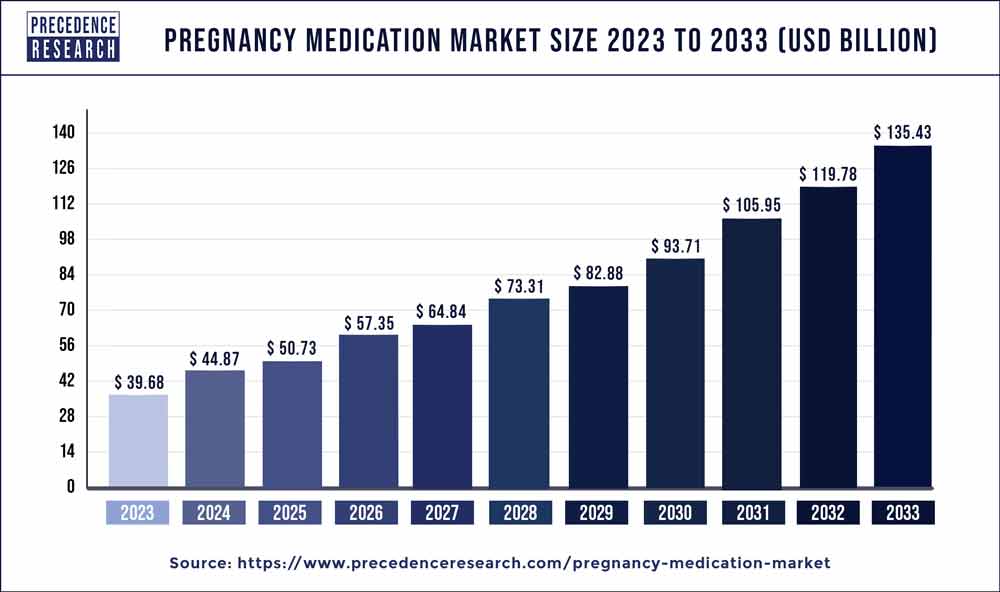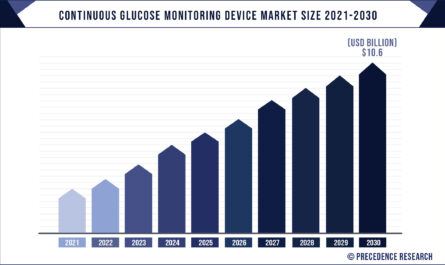The global pregnancy medication market size reached USD 39.68 billion in 2023 and is projected to hit around USD 135.43 billion by 2033 growing at a CAGR of 13.06% from 2024 to 2033.
Key Points
- North America dominated the market with the largest share in 2023.
- Asia Pacific is expected to witness the fastest rate of growth during the forecast period.
- By type, under the drug class segment, the antacids sub-segment accounted for the dominating share in the market in 2023.
- By type, under the drug class segment, the antianemia sub-segment is observed to witness a notable rate of growth during the forecast period.
- By distribution channel, the hospital pharmacy segment held the largest share of the market in 2023.
- By distribution channel, the online pharmacy segment is observed to experience a significant rate of growth during the forecast period.
- By pregnancy stage, the 3rd-trimester segment dominated the market in 2023.
The pregnancy medication market encompasses a wide range of pharmaceuticals and therapeutic interventions aimed at addressing various health concerns during pregnancy. These medications play a crucial role in ensuring the well-being of both the mother and the developing fetus. The market includes drugs for managing common pregnancy-related issues such as nausea, gestational diabetes, hypertension, and infections, as well as medications for prenatal vitamins and supplements.
In recent years, there has been a significant increase in the demand for pregnancy medications, driven by several factors including rising maternal age, increasing prevalence of chronic diseases among pregnant women, and advancements in medical technology. Additionally, growing awareness about the importance of prenatal care and the availability of various over-the-counter and prescription medications have contributed to the expansion of the market.
Get a Sample: https://www.precedenceresearch.com/sample/3893
Growth Factors
- Rising Maternal Age: With more women delaying childbirth to pursue education and career opportunities, there is a growing trend of pregnancies occurring at older ages. Advanced maternal age is associated with higher risks of complications such as gestational diabetes and hypertension, leading to an increased demand for medications to manage these conditions.
- Increasing Prevalence of Chronic Diseases: The prevalence of chronic conditions such as diabetes, hypertension, and obesity among pregnant women is on the rise. These conditions require specialized medication management during pregnancy to ensure the health of both the mother and the fetus, driving the demand for pregnancy medications.
- Advancements in Medical Technology: Technological advancements in prenatal screening, diagnostic tools, and medical imaging have improved the ability to detect and monitor pregnancy-related complications. This has led to early identification of health issues, prompting the need for pharmacological interventions to manage these conditions effectively.
- Growing Awareness and Accessibility: There is a growing awareness among pregnant women about the importance of prenatal care and the availability of medications to address common pregnancy-related symptoms and conditions. Increased access to healthcare services and over-the-counter medications further contribute to the growth of the pregnancy medication market.
Region Analysis:
The demand for pregnancy medications varies across different regions due to factors such as healthcare infrastructure, socio-economic conditions, cultural norms, and government policies. In developed regions such as North America and Europe, the market is characterized by high healthcare expenditures, advanced medical facilities, and widespread access to prenatal care services. These regions also have stringent regulatory frameworks governing the approval and marketing of pregnancy medications, ensuring safety and efficacy standards are met.
In contrast, developing regions in Asia-Pacific, Latin America, and Africa face challenges such as limited access to healthcare facilities, inadequate maternal healthcare services, and socio-cultural barriers to seeking medical assistance during pregnancy. However, improving healthcare infrastructure, rising disposable incomes, and increasing awareness about maternal and child health are driving the growth of the pregnancy medication market in these regions.
Pregnancy Medication Market Scope
| Report Coverage | Details |
| Growth Rate from 2024 to 2033 | CAGR of 13.06% |
| Global Market Size in 2023 | USD 39.68 Billion |
| Global Market Size by 2033 | USD 135.43 Billion |
| Largest Market | North America |
| Base Year | 2023 |
| Forecast Period | 2024 to 2033 |
| Segments Covered | By Type, By Distribution Channel, and By Pregnancy Stage |
| Regions Covered | North America, Europe, Asia-Pacific, Latin America, and Middle East & Africa |
SWOT Analysis
Strengths:
- Essential role in ensuring maternal and fetal health during pregnancy.
- Wide range of medications available for various pregnancy-related conditions.
- Technological advancements improving diagnostic and treatment options.
Weaknesses:
- Potential risks associated with medication use during pregnancy.
- Limited research on the safety and efficacy of certain drugs in pregnant women.
- Access barriers in underserved regions due to healthcare disparities.
Opportunities:
- Growing demand for personalized and precision medicine in pregnancy care.
- Expansion of product portfolios by pharmaceutical companies to address unmet needs.
- Collaborations between healthcare providers, researchers, and policymakers to improve maternal healthcare outcomes.
Threats:
- Stringent regulatory requirements and safety concerns leading to delays in drug development and approval.
- Increasing litigation risks for pharmaceutical companies related to adverse pregnancy outcomes.
- Economic uncertainties and healthcare budget constraints affecting market growth.
Read Also: Cloud-based Contact Center Market Size to Cross USD 155.74 Bn by 2033
Recent Developments
- In March 2023, Pfizer unveiled its plans to launch RSV vaccines for older adults and pregnant women in the US and Europe. Pfizer opened a new tab and is ready to launch its respiratory syncytial virus (RSV) vaccine. Both Pfizer and British drugmaker GSK opened a new tab that has RSV vaccines which they are planning to launch in the United States and Europe.
- In November 2023, Wayne State launched a preterm birth awareness campaign. Wayne State University’s Office of Women’s Health serves as the coordinating center of the SOS MATERNITY Network in Michigan.
- In March 2023, BJ Government Medical College in Pune collaborated with Johns Hopkins
- University and Weill Cornell Medical College, USA launched a new study to assess Tuberculosis (TB), Human Immunodeficiency Viruses (HIV), and gestational diabetes among pregnant women.
Pregnancy Medication Market Companies
- Roche Holding AG
- Pfizer
- Glenmark Pharmaceuticals Ltd
- Alkem Laboratories Limited
- Lupin Limited
- Amgen Inc
- AbbVie
- Piramal Enterprises Limited
- Sanofi
- Janssen
- Sun Pharma
- Regeneron
- Dr. Reddy’s Laboratories
- Alembic Pharmaceuticals Ltd
- Takeda
- Cipla Inc
- Viatris Inc(Mylan Inc.)
- GSK
Segments Covered in the Report
By Type
- Drug Class
- Antianemia
- Antacids
- Antiallergic
- Analgesics
- Antimicrobials
- Nutritional Supplements
- Others
By Distribution Channel
- Hospital Pharmacy
- Retail Pharmacy
- Online Pharmacy
By Pregnancy Stage
- 3rd-trimester
- 1st trimester
- 2nd trimester
By Geography
- North America
- Europe
- Asia-Pacific
- Latin America
- Middle East and Africa
Contact Us:
Mr. Alex
Sales Manager
Call: +1 9197 992 333
Email: sales@precedenceresearch.com
Web: https://www.precedenceresearch.com
Blog: https://www.expresswebwire.com/
Blog: https://www.uswebwire.com/


